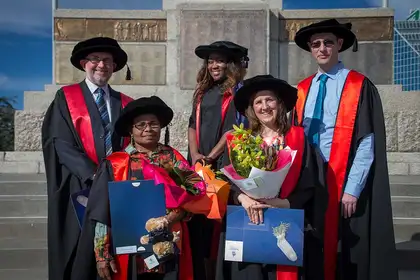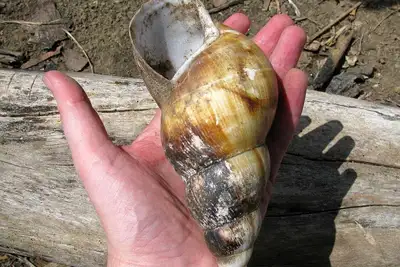
Development Studies PhDs Dr Ross Cassells, Dr Dorcas Shumba, Dr Dean Stronge, and (front) Dr Dora Ayius and Dr Emma Hughes.
From the benefits of tourism for Fijians to the impact of invasive giant African snails in the Solomon Islands – five new PhD graduates from Massey University’s Development Studies programme are tackling critical issues in the Pacific region and beyond.
The five include staff member Dr Emma Hughes, a Research and Development Officer in the Research and Enterprise, whose thesis examined how multinational hotels in Fiji support community development.
Dr Hughes says that while it is not surprising there are challenges for internationally owned corporations in responding to local community priorities; “what was particularly valuable was understanding local perspectives of hotel-led support.
“The local communities I spoke to in Fiji in general welcome tourism and the potential it offers to improve standards of living, but they were less interested in charitable donations and more interested in being part of the conversations that determine a fair share of resources for themselves and for future generations.”
She did a master’s degree in the United Kingdom, and has been involved in international and local development projects there and in Egypt, Chile and New Zealand. Her two daughters accompanied her on her fieldwork to Fiji when they were aged nine and 11 and attended the local schools in Fiji. “It was a great experience for them, and they made a strong bond with the friends they made there.”

A giant African snail - the invasive alien species that has been devastating crops in the Solomon Islands.
Alien species destroying crops and livelihoods
In his thesis, Dr Dean Stronge investigated the devastating impact of giant African snails (Achatina fulica) on the livelihoods of Solomon Islanders living in rural areas. The snails are classified as an Invasive Alien Species (IAS) – defined as species whose introduction and/or spread outside their natural past or present distribution poses a threat to biological diversity.
They can grow to 20cm long, destroying crops and people’s means of survival. However, the species’ impact is not yet being taken seriously as a development issue, he says.
“It’s not just a food security issue, but touches on all aspects of peoples lives –financial, social and environmental,” says Dr Stronge. “Health, education, even infrastructure development is either directly or indirectly influenced by invasive species.
“One family I talked to had given up growing their own food because of the giant African snail. The snails had destroyed all their crops and they were unable to keep on top of its control due to the numbers. As a result they couldn't afford to send all their children to school – their eldest children had been pulled from school and only their youngest daughter was currently attending.”
Tracking Solomon Islands’ turbulent history
Dr Ross Cassells looked into a hybrid form of government in the Solomon Islands, which favours chiefs and church over a Westminster-based constitution. He has had a long association with the Solomon Islands, from 1991 when he went there to do field studies for his master’s degree in Development Studies, based in Nukiki village on what was then the very remote island of Choiseul.
“The experience of living with, and being accepted by, a local community in a remote subsistence village, and learning the local pijin language in order to conduct my research, made a huge impression on me. It was life-changing and I developed a huge respect for rural Solomon Islanders who taught me much about their way of life, their customs, how they governed their community, and their superb understanding of their natural world.”
Later, he was project adviser on the Ministry of Foreign Affairs and Trade’s Customary Land Reforestation Project in Solomon Islands and several years later managed New Zealand’s Voluntary Service Abroad (VSA) programme in Solomon Islands.
When New Zealand, Australia and other Pacific nations sent peacekeepers to the Solomon Islands in response to armed conflict between factions of the Malaitan and Guadalcanal communities, he became concerned at moves to reintroduce a Western style political system that had already failed there. “Surely a political system that more accurately reflected Solomon Islanders own systems of governance would have a better chance of long-term success, I reasoned, and this is what inspired me to do this research.”
Papua New Guinea and Zimbabwe focus for research
Dr Dorcas Shumba, from Zimbabwe, explored how gender differences produce differential risks and vulnerability to environmental change among rural men and women in Zimbabwe. “My study observed that in crisis environments, gender does not necessarily transcend other forms of disadvantage,” she says.
Dr Dora Ayius investigated the development of health services and community resilience in mining towns of Papua New Guinea.
Regina Scheyvens, Professor of Development Studies in the School of People, Environment and Planning, said she and her colleagues; “are so excited, and proud, to experience the graduations of five Development Studies PhD scholars today. They have all contributed knowledge that could have real impacts on the wellbeing and sustainable development of peoples in the Pacific Islands and Southern Africa.”